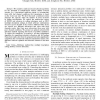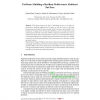139 search results - page 8 / 28 » Heterogeneity increases multicast capacity in clustered netw... |
ICNP
2000
IEEE
14 years 2 months ago
2000
IEEE
Multicast sessions may have a large number of receivers with heterogeneous reception capacities. To accommodate this heterogeneity, various multi-rate schemes, based upon the use ...
ICC
2007
IEEE
14 years 4 months ago
2007
IEEE
— To enhance the generalization capacity of a distribution learning method, we propose to use a fuzzy Bayesian framework based on Bayes rules. The precision of the learning resul...
INFOCOM
2006
IEEE
14 years 3 months ago
2006
IEEE
— We consider a multicast resource allocation problem for the downlink in OFDM-based wireless cellular network systems. In a conventional multicast system, to accommodate users w...
WCW
2004
Springer
14 years 3 months ago
2004
Springer
This paper proposes the idea of emulating fat-trees in overlays for multi-source multicast applications. Fat-trees are like real trees in that their branches become thicker the clo...
USENIX
2007
14 years 1 days ago
2007
Random peer selection is used by numerous P2P applications; examples include application-level multicast, unstructured file sharing, and network location mapping. In most of thes...


